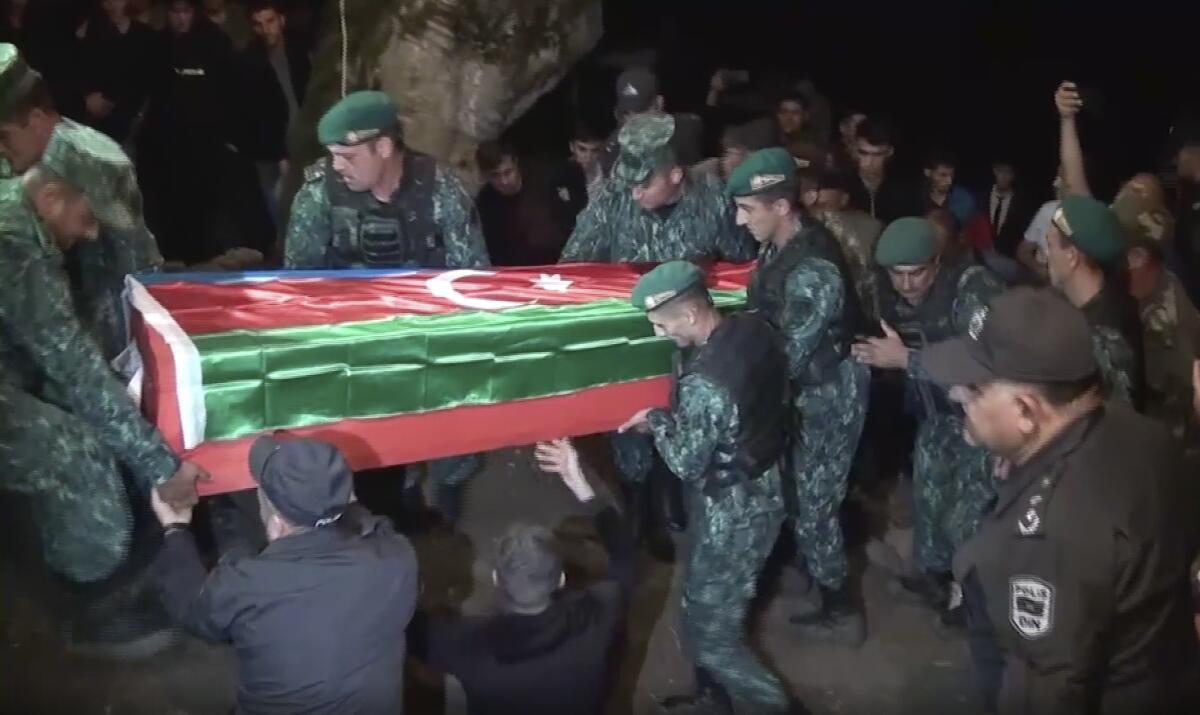Cease-fire holds between Armenia and Azerbaijan

YEREVAN, Armenia — A cease-fire between Armenia and Azerbaijan appeared to be holding Thursday following two days of fighting that killed 176 soldiers.
Armen Grigoryan, the secretary of Armenia’s Security Council, said the truce brokered through international mediation took effect at 8 p.m. local time Wednesday. A previous cease-fire that Russia brokered Tuesday had quickly failed.
The Armenian Defense Ministry in Yerevan said Thursday that the situation on the border with Azerbaijan has been quiet since the cease-fire started and no violations were reported. There was no immediate comment from Azerbaijan’s government in Baku.
The cease-fire declaration followed two days of heavy fighting that marked the largest outbreak of hostilities between the two longtime adversaries in nearly two years.
Armenia and Azerbaijan traded blame for the shelling, with Armenian authorities accusing Baku of unprovoked aggression and Azerbaijani officials saying their country was responding to Armenian attacks.
Armenian Prime Minister Nikol Pashinyan said Wednesday that 105 of his country’s soldiers had been killed since fighting erupted early Tuesday. Azerbaijan’s Defense Ministry said Thursday that it lost 71.
Their decades-old battle over the mountainous territory of Nagorno-Karabakh has come to define how Armenians and Azerbaijanis view themselves.
The ex-Soviet countries have been locked in a decades-old conflict over Nagorno-Karabakh, which is part of Azerbaijan but has been under the control of ethnic Armenian forces backed by Armenia since a separatist war there ended in 1994.
During a six-week war in 2020, Azerbaijan reclaimed broad swaths of Nagorno-Karabakh and adjacent territories held by Armenian forces. More than 6,700 people died in the fighting, which ended with a Russia-brokered peace agreement. Moscow deployed about 2,000 troops to the region to serve as peacekeepers under the deal.
On Wednesday, Pashinyan told lawmakers that Armenia is ready to recognize Azerbaijan’s territorial integrity in a future peace treaty, provided that it relinquishes control of areas in Armenia that its forces have seized.
“We want to sign a document, for which many people will criticize and denounce us and call us traitors, and they may even decide to remove us from office, but we would be grateful if Armenia gets a lasting peace and security as a result of it,” Pashinyan said.
Some in the opposition saw the statement as a sign of Pashinyan’s readiness to cave in to Azerbaijani demands and recognize Azerbaijan’s sovereignty over Nagorno-Karabakh. Thousands of angry protesters quickly descended on the government’s headquarters, accusing Pashinyan of treason and demanding that he step down. Protests were also held in other Armenian cities.
More to Read
Sign up for Essential California
The most important California stories and recommendations in your inbox every morning.
You may occasionally receive promotional content from the Los Angeles Times.











